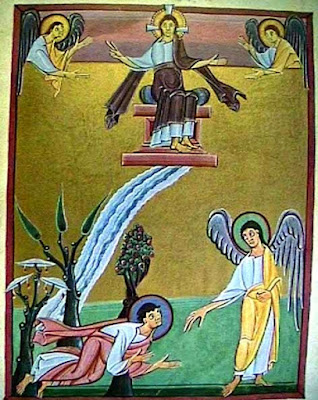(Optional Memorial of the Blessed Virgin Mary)
On Saturdays in Ordinary Time when there is no obligatory memorial, an optional memorial of the Blessed Virgin Mary is allowed.[1] Mass texts may be taken from the Common of the Blessed Virgin Mary, from a Votive Mass, or from the special collection of Masses for the Blessed Virgin Mary. Suggested for this date: #37. The Blessed Virgin Mary, Mother of Divine Hope.
 |
| “The River and the Tree of Life” by an UNKNOWN; Illustrator of 'Bamberg Apocalypse', Reichenau, 1000-20. |
Commentary:
Reading 1: Revelation 22:1-7
Commentary on Rv 22:1-7
This final vision of the heavenly kingdom provides us with the ultimate peaceful setting. God and the Christ, the Lamb of God, preside over the water of life flowing through a land filled with an abundance of good things and nothing evil present.
When the reference is made to the name inscribed on their foreheads: “They will look upon his face, and his name will be on their foreheads,” it is a direct corollary to the Hebrew phylactery, small, black leather, cube-shaped cases containing Torah texts written on parchment worn on the forehead to symbolize they had internalized God’s law. (Note: the sign of the beast is in the same place for those who are thrown down.)
Our passage ends, appropriately: “Behold, I am coming soon.” This passage is used on the last day of the liturgical year.
----------------------------------------------------------------
Responsorial Psalm: Psalm 95:1-2, 3-5, 6-7ab
R. (1 Cor 16: 22b, see Rev. 22: 20c) Maranatha! Come, Lord Jesus!
Commentary on Ps 95:1-2, 3-5, 6-7ab
Psalm 95 is a song of praise. These strophes rejoice in God’s saving help and extol his greatness as the creator of all things. The psalmist enjoins the faithful to bow down and worship the one who is the great shepherd, who protects his flock from all ills.
The Advent response itself is explained thus: “Marana tha: an Aramaic expression probably used in the early Christian liturgy. As understood here (‘O Lord, come!’), it is a prayer for the early return of Christ. If the Aramaic words are divided differently (Maran atha, ‘Our Lord has come’), it becomes a credal declaration. The former interpretation is supported by what appears to be a Greek equivalent of this acclamation in Rev 22:20 ‘Amen. Come, Lord Jesus!’” [5]
----------------------------------------------------------------
Gospel: Luke 21:34-36
Commentary on Lk 21:34-36
This selection is the end of Jesus' final public exhortation before his passion and death. Some scholars have speculated that the Gospel author could be using a fragment of some forgotten scroll from St. Paul because the Hellenistic form is so similar (see 1 Thessalonians 5:4).
"It is clear from this short section that Luke (different from 1 Thessalonians) eliminated the idea of an immediate parousia. Sudden trials will strike everyone, and so there is need of continual vigilance. Everyone, however, will eventually take part in the parousia. How a person lives now determines how he will 'stand before the Son of Man.'"[6] Jesus reminds his disciples not to become complacent in their practice of the faith. It is one of his sternest warnings that the end will come without notice and judgment will be immediate.
CCC: Lk 21:34-36 2612
----------------------------------------------------------------
Reflection:
It is almost as if those who assembled our reading could not wait for Advent to begin. The passage from St. John’s Revelation ends with: “Behold, I am coming soon.” The Psalm response is: “Marana tha! Come, Lord Jesus!” It is interspersed with Psalm 95, the invitatory psalm we use in the Divine Office. And finally we are given a Gospel that has Jesus telling us that we must hold ourselves in constant preparation because we do not want to be caught unawares when the Lord comes again.
On this last day before the season of Advent begins, it is good to think about this past year and what we have done, right and wrong: “For we must all appear before the judgment seat of Christ, so that each one may receive recompense, according to what he did in the body, whether good or evil.” (2 Corinthians 5:10) As the analogy we have been using implies, take one more good look in the mirror of our souls. What do we see there that we had not noticed before?
Let’s think about our interactions at work or school. Were we living God’s law of love as best we could? Did we consciously hurt or degrade a person? Do we need to make amends and apologize to anyone specifically?
What about in our family: did we set the good example that we are asked to? Did we show those we love the most that God does rule in our hearts? (This is one of the most difficult!)
And finally, in our solitude, have we worked hard at allowing the Lord to guide our inmost thoughts and therefore drive our actions with those about us? Have we been diligent in our prayer, in praise of the one who saves us all, for ourselves, and for the world? Have we been faithful in our participation in the sacraments of Eucharist, Reconciliation, and, as needed, Anointing? Have we allowed God’s grace to buoy us up and give us strength?
As we think through this short list, most of us will find ways to improve, to grow closer to God in the coming new year of grace. Let us add a prayer for strength, that we might walk hand in hand with the Lord throughout the year.
Pax
[1] General Norms for the Liturgical Year and the Calendar Miscellaneous Notes no. 5
[2] The picture used today is “The River and the Tree of Life” by an UNKNOWN; Illustrator of 'Bamberg Apocalypse', Reichenau, 1000-20.
[5] See NAB footnote on 1 Cor 16:22.
[6] Jerome Biblical Commentary, Prentice Hall, Inc., © 1968, 44:149, p. 155.

